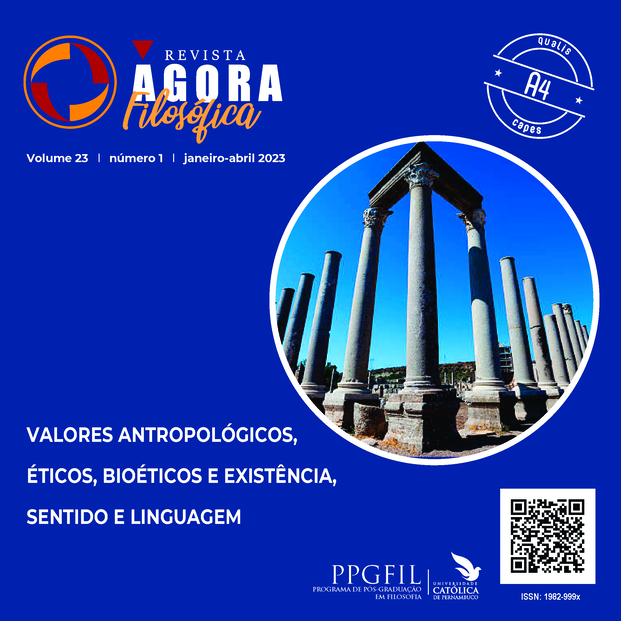Thomas Reid and the Higher Order Theories of Consciousness
DOI:
https://doi.org/10.25247/P1982-999X.2023.v23n2.p62-75Keywords:
Philosophy of Mind, Higher Orders Theories, Consciousness, Perception, SensationAbstract
It is unquestionable to have a theory of consciousness in Thomas Reid (1710 - 1796). However, at least two antagonistic positions are presented to describe this theory. Is Reid's theory of consciousness different from contemporary higher order theories, as Rebecca Copenhaver (2007) argues? Or would Reid agree with the "higher order theory", as Udo Thiel (2010) thinks? In this article I will outline something of Reid's theory of consciousness that would possibly lead Thomas Reid to agree with higher order theories without compromising his system of direct realism. For this purpose, we will develop the article as follows: (1) Introduction to the debate and discussions about higher-order theories of consciousness; (2) a presentation of Thomas Reid's theory of consciousness; (3) conclusion. We will appropriate the analysis of concepts on the subject and on Reid's thought.
Downloads
References
ARMSTRONG, David. What is Consciousness? In: Block, N.; Flanagan, O.; Güzeldere, G. (Orgs.). The Nature of Consciousness: Philosophical Debates. Cambridge, Massachusetts: MIT Press, 1997, p.721 – 728.
CHALMERS, David J. The Craracter of Consciousness. New York, NY: Oxford University Press, 2010.
COPENHAVER, Rebecca. Thomas Reid’s Philosophy of Mind: consciousness and intentionality. In: Philosophy Compass, vol. 3, n. 1, 2006, p. 278-289.
COPENHAVER, Rebecca. Reid on Consciouness: HOP, HOT ou FOR? In: The Philosophical Quartely, vol 57, n. 229, out – 2007, p. 613 – 634.
FOLESCU, Marina. Thomas Reid: Philosophy of Mind. Disponível em: < http://www.iep.utm.edu/reidmind/>.
GENNARO, Rocco J. (ed.). Higher-Order Theories of Consciousness: an anthology. Amsterdam, Netherlands; Philadelphia, USA: John Benjamins Publishing, 2004.
GULICK, Robert Van. Consciência. Tradução de Marcos Aurélio & Marcelo Fischborn. In: Investigação Filosófica, vol. E2, artigo digital 2, 2012.
HOSSACK, Keith. Reid and Brentano on Consciousness. In: TEXTOR, Mark (ed). The Austrian contribution to analytic philosophy. London-New York: Routledge, 2006, p. 36-63.
LEHRER, Keith. Reid on Consciousness. In: Reid Studies, n. 1, 1986-7, p. 1-9.
LOCKE, John. Ensaio sobre o entendimento humano. vol. 1 (Livro I e II); 5ªed. Lisboa, Portugal: Calouste Gulbenkian, 2014.
LYCAN, William G. The Superiority of HOP to HOT. In: GENNARO, Rocco J. (ed.). Higher-Order Theories of Consciousness: an anthology. Amsterdam, Netherlands; Philadelphia, USA: John Benjamins Publishing, 2004, p. 93-114.
NAGEL, Thomas. Como é ser um morcego? In: Cadernos de História e Filosofia da Ciência, Campinas, Série 3, Vol. 15, no 1, jan-jun, 2005, p. 245-262.
NAGEL, Thomas. Mind and Cosmos: why the materialist neo-darwinian conception of nature is almost certainly false. New York, NY: Oxford Universtiy Press, 2012.
NICHOLS, Ryan. Thomas Reid. Disponível em: https://plato.stanford.edu/entries/reid/.
REID, Thomas. Investigação sobre a mente humana segundo os princípios do Senso Comum. São Paulo: Vida Nova, 2013.
REID, Thomas. Essays on the intellectual powers of man. 2 vol. Dublin: L. White, 1785.
REID, Thomas. Essays on the intellectual powers of man. In: Early Modern Texts. Disponível em: http://www.earlymoderntexts.com/authors/reid.
ROSENTHAL, DAVID. Two Concepts of Consciouness. In: Philosophical Studies 49, 1986, p. 329-359.
ROSENTHAL, David. A Theory of Consciousness. In: BLOCK, N.; FLANAGAN, O.; GÜZELDERE, G. (Orgs.). The Nature of Consciousness: Philosophical Debates. Cambridge, Massachutts: MIT Press, 1997, p. 729-753.
THIEL, Udo. Reid and Higher Order Theories of Consciousness. In: Journal of Scottisch Thought. Centre for Scottish Thought University of Aberdeen, vol. 3, 2010, p. 9-22.
Downloads
Published
Issue
Section
License
Copyright (c) 2023 Gaspar de Souza

This work is licensed under a Creative Commons Attribution 4.0 International License.
You are free to:
- Share — copy and redistribute the material in any medium or format for any purpose, even commercially.
- Adapt — remix, transform, and build upon the material for any purpose, even commercially.
- The licensor cannot revoke these freedoms as long as you follow the license terms.
Under the following terms:
- Attribution — You must give appropriate credit , provide a link to the license, and indicate if changes were made . You may do so in any reasonable manner, but not in any way that suggests the licensor endorses you or your use.
- No additional restrictions — You may not apply legal terms or technological measures that legally restrict others from doing anything the license permits.
Notices:
You do not have to comply with the license for elements of the material in the public domain or where your use is permitted by an applicable exception or limitation .
No warranties are given. The license may not give you all of the permissions necessary for your intended use. For example, other rights such as publicity, privacy, or moral rights may limit how you use the material.
















